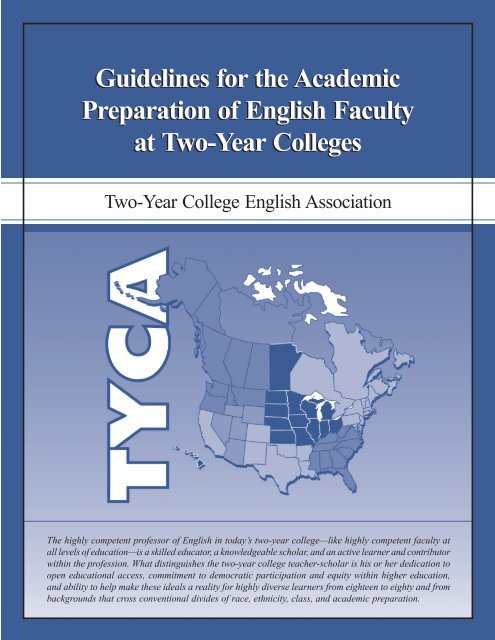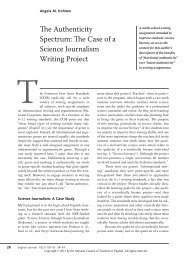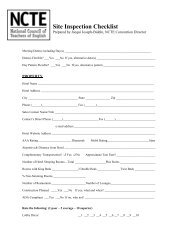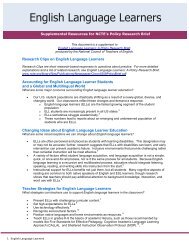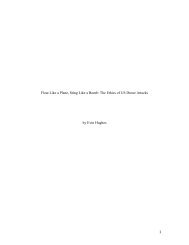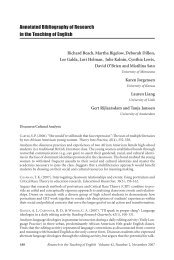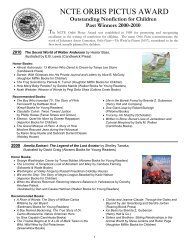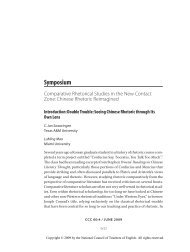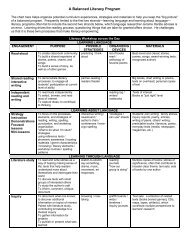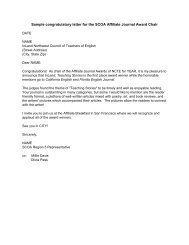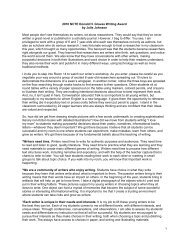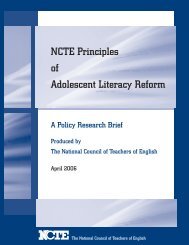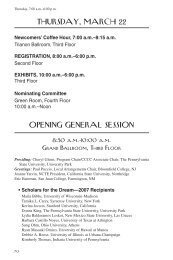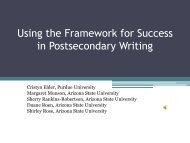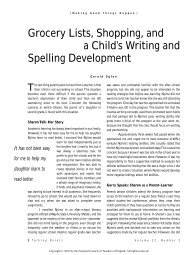Guidelines for the Academic Preparation of English Faculty at Two ...
Guidelines for the Academic Preparation of English Faculty at Two ...
Guidelines for the Academic Preparation of English Faculty at Two ...
Create successful ePaper yourself
Turn your PDF publications into a flip-book with our unique Google optimized e-Paper software.
1<br />
<strong>Guidelines</strong> <strong>for</strong> <strong>the</strong> <strong>Academic</strong><br />
<strong>Prepar<strong>at</strong>ion</strong> <strong>of</strong> <strong>English</strong> <strong>Faculty</strong><br />
<strong>at</strong> <strong>Two</strong>-Year Colleges<br />
<strong>Two</strong>-Year College <strong>English</strong> Associ<strong>at</strong>ion<br />
The highly competent pr<strong>of</strong>essor <strong>of</strong> <strong>English</strong> in today’s two-year college—like highly competent faculty <strong>at</strong><br />
all levels <strong>of</strong> educ<strong>at</strong>ion—is a skilled educ<strong>at</strong>or, a knowledgeable scholar, and an active learner and contributor<br />
within <strong>the</strong> pr<strong>of</strong>ession. Wh<strong>at</strong> distinguishes <strong>the</strong> two-year college teacher-scholar is his or her dedic<strong>at</strong>ion to<br />
open educ<strong>at</strong>ional access, commitment to democr<strong>at</strong>ic particip<strong>at</strong>ion and equity within higher educ<strong>at</strong>ion,<br />
and ability to help make <strong>the</strong>se ideals a reality <strong>for</strong> highly diverse learners from eighteen to eighty and from<br />
backgrounds th<strong>at</strong> cross conventional divides <strong>of</strong> race, ethnicity, class, and academic prepar<strong>at</strong>ion.
2<br />
Prepared by an Ad Hoc Committee <strong>of</strong> <strong>the</strong> <strong>Two</strong>-Year College <strong>English</strong> Associ<strong>at</strong>ion <strong>of</strong> <strong>the</strong><br />
N<strong>at</strong>ional Council <strong>of</strong> Teachers <strong>of</strong> <strong>English</strong><br />
Jo Ann Buck, PhD, Guil<strong>for</strong>d Technical Community College, North Carolina, Chair<br />
Sallyanne H. Fitzgerald, EdD, Chabot College, Cali<strong>for</strong>nia, Past Chair<br />
Yulanda McKinney, Monroe Community College, New York<br />
Jude Okpala, PhD, Howard County Community College, Columbia, Maryland<br />
Leslie Roberts, Oakland Community College, Michigan<br />
Marilyn Valentino, PhD, Lorain County Community College, Ohio<br />
Xiao Wang, PhD, Broward Community College, Florida<br />
Approved by <strong>the</strong> <strong>Two</strong>-Year College <strong>English</strong> Associ<strong>at</strong>ion Executive Committee, November 20, 2004.
3<br />
Table <strong>of</strong> Contents<br />
Executive Summary ______________________________________ 4<br />
St<strong>at</strong>ement <strong>of</strong> Purpose _____________________________________ 6<br />
Changes in Theory and Praxis in <strong>English</strong> _____________________ 7<br />
Changes in Student Popul<strong>at</strong>ions ____________________________ 8<br />
Guiding Principles _______________________________________ 9<br />
Formal <strong>Prepar<strong>at</strong>ion</strong> _____________________________________ 10<br />
A Framework <strong>for</strong> Ongoing Pr<strong>of</strong>essional Development _________ 11<br />
Adjunct Qualific<strong>at</strong>ions ___________________________________ 11<br />
Bibliography __________________________________________ 12
4<br />
<strong>Guidelines</strong> <strong>for</strong> <strong>the</strong> <strong>Academic</strong> <strong>Prepar<strong>at</strong>ion</strong> <strong>of</strong><br />
<strong>English</strong> <strong>Faculty</strong> <strong>at</strong> <strong>Two</strong>-Year Colleges<br />
Executive Summary<br />
The <strong>Two</strong>-Year College <strong>English</strong> Associ<strong>at</strong>ion <strong>of</strong> <strong>the</strong> N<strong>at</strong>ional Council <strong>of</strong> Teachers <strong>of</strong> <strong>English</strong><br />
developed <strong>the</strong> following document to give guidelines <strong>for</strong> <strong>the</strong> academic prepar<strong>at</strong>ion <strong>of</strong> twoyear<br />
college <strong>English</strong> faculty to administr<strong>at</strong>ors who hire teachers <strong>at</strong> two-year institutions, to<br />
university faculty who <strong>of</strong>fer gradu<strong>at</strong>e courses or are engaged in training future two-year<br />
college teachers, and to gradu<strong>at</strong>es who want some direction in deciding appropri<strong>at</strong>e courses<br />
in <strong>the</strong>ir prepar<strong>at</strong>ion to become two-year college <strong>English</strong> faculty.<br />
<strong>Two</strong> major questions frame <strong>the</strong> document; wh<strong>at</strong> are <strong>the</strong> characteristics <strong>of</strong> effective twoyear<br />
college <strong>English</strong> teachers, and how can <strong>the</strong>se characteristics be fostered through<br />
academic prepar<strong>at</strong>ion and pr<strong>of</strong>essional development?<br />
Characteristics <strong>of</strong> Effective <strong>Two</strong>-Year College <strong>English</strong> <strong>Faculty</strong><br />
• Are reflective practitioners and flexible teacher-scholars<br />
• Center <strong>the</strong>ir classrooms on <strong>the</strong> student<br />
• Understand diversity and teaching to diverse ethnic, economic, and ability popul<strong>at</strong>ions<br />
• Challenge <strong>the</strong>ir students<br />
• Ground <strong>the</strong>ir teaching in <strong>the</strong>ory and research<br />
• Collabor<strong>at</strong>e with colleagues in developing curriculum<br />
• Actively serve <strong>the</strong>ir colleges and <strong>the</strong>ir communities<br />
• Particip<strong>at</strong>e in pr<strong>of</strong>essional community through conferences, present<strong>at</strong>ions, public<strong>at</strong>ions, and ongoing<br />
scholarship<br />
<strong>Academic</strong> <strong>Prepar<strong>at</strong>ion</strong> and Pr<strong>of</strong>essional Development<br />
Baccalaure<strong>at</strong>e degree with major in <strong>English</strong> and <strong>the</strong>se core courses:<br />
• Western and non-Western liter<strong>at</strong>ure, including literary <strong>the</strong>ory<br />
• Grammar and linguistics<br />
• Writing (including expository writing, cre<strong>at</strong>ive writing, technical writing, writing in <strong>the</strong> disciplines)<br />
Additional courses recommended in:<br />
• Teaching writing (including courses in basic writers, bilingual/bicultural writers)<br />
• Teaching reading<br />
• The adult learner<br />
• Curriculum
5<br />
Master’s degree in <strong>English</strong> or <strong>English</strong> educ<strong>at</strong>ion should include:<br />
• In-depth courses in <strong>the</strong> core group above<br />
• O<strong>the</strong>r coursework in:<br />
• Theories <strong>of</strong> learning, including basic writers and literacy <strong>for</strong> adult learners<br />
• Composition <strong>the</strong>ory and pedagogy<br />
• Rhetoric and rhetorical <strong>the</strong>ory<br />
• Reading and literacy<br />
• Multilingual/multicultural, ESL educ<strong>at</strong>ion<br />
• Computer-medi<strong>at</strong>ed learning and digital environments<br />
• Research methods<br />
• Suggested elective coursework in:<br />
• Diversity<br />
• Writing across <strong>the</strong> curriculum<br />
• Writing centers<br />
• Classroom assessment<br />
Fur<strong>the</strong>r Gradu<strong>at</strong>e Studies and Continuing <strong>Faculty</strong> Development<br />
Fur<strong>the</strong>r faculty development, which may involve doctoral work, should include:<br />
• Higher educ<strong>at</strong>ion politics<br />
• Issues <strong>of</strong> language policy<br />
• Teaching non-traditional students, students with disabilities, and ethnically diverse students<br />
• Course development and assessment; faculty/self-evalu<strong>at</strong>ion<br />
Adjunct <strong>Faculty</strong><br />
Since much <strong>of</strong> <strong>the</strong> teaching <strong>of</strong> composition is taught by adjunct faculty, <strong>the</strong>y should have <strong>the</strong> same<br />
qualific<strong>at</strong>ions expected <strong>for</strong> full-time hires, specifically, a master’s degree in <strong>English</strong> with coursework in<br />
composition <strong>the</strong>ory or <strong>the</strong> teaching <strong>of</strong> writing, or experience with <strong>the</strong> N<strong>at</strong>ional Writing Project, writing<br />
centers, or similar organiz<strong>at</strong>ions.<br />
For those who may be teaching without this background (whe<strong>the</strong>r full-time or adjunct), <strong>the</strong> <strong>English</strong><br />
Department in <strong>the</strong> two-year college is urged to <strong>of</strong>fer courses or workshops in <strong>the</strong>se areas as well as in<br />
methods <strong>of</strong> evalu<strong>at</strong>ion, adult learners, and assessment.
6<br />
<strong>Guidelines</strong> <strong>for</strong> <strong>the</strong> <strong>Academic</strong> <strong>Prepar<strong>at</strong>ion</strong> <strong>of</strong> <strong>English</strong> <strong>Faculty</strong> <strong>at</strong><br />
<strong>Two</strong>-Year Colleges<br />
St<strong>at</strong>ement <strong>of</strong> Purpose<br />
Effective community college teachers are reflective and flexible teacher-scholars whose<br />
primary role is to enable students <strong>of</strong> widely differing backgrounds, needs, and interests to<br />
learn most effectively. This document <strong>of</strong>fers suggestions <strong>for</strong> both <strong>the</strong> training and <strong>the</strong><br />
philosophy th<strong>at</strong> two-year college teacher-scholars <strong>of</strong> <strong>the</strong> twenty-first century need to bring to<br />
<strong>the</strong> <strong>English</strong> classroom in order to fulfill this role.<br />
The audience <strong>for</strong> <strong>the</strong>se guidelines includes pr<strong>of</strong>essionals <strong>at</strong> all levels:<br />
• gradu<strong>at</strong>e students who are preparing to teach in two-year colleges;<br />
• university faculty who are engaged in training teachers or in <strong>of</strong>fering gradu<strong>at</strong>e <strong>English</strong><br />
courses;<br />
• those who seek adjunct teaching roles <strong>at</strong> two-year colleges;<br />
• faculty, staff, and administr<strong>at</strong>ors who are involved in hiring <strong>English</strong> teachers <strong>for</strong> twoyear<br />
college classes.<br />
The need <strong>for</strong> guidelines established by pr<strong>of</strong>essionals within two-year colleges is urgent,<br />
as three conditions suggest <strong>the</strong> need <strong>for</strong> many more community college faculty within <strong>the</strong><br />
next ten years. First, as Gener<strong>at</strong>ion Y students reach college age and as increasing numbers<br />
<strong>of</strong> four-year colleges and universities reach enrollment s<strong>at</strong>ur<strong>at</strong>ion points, two-year colleges<br />
are poised to increase positions to serve <strong>the</strong> additional students. Second, current <strong>English</strong><br />
faculty who were hired during <strong>the</strong> rapid growth <strong>of</strong> two-year colleges in <strong>the</strong> middle to l<strong>at</strong>ter<br />
part <strong>of</strong> <strong>the</strong> twentieth century are now retiring in record numbers. Third, many <strong>of</strong> <strong>the</strong>se<br />
positions will be filled by adjunct faculty as well as by recent gradu<strong>at</strong>e students embarking<br />
on careers.<br />
A recent study from <strong>the</strong> U.S. Department <strong>of</strong> Educ<strong>at</strong>ion reports th<strong>at</strong> almost two-thirds<br />
(64.9%) <strong>of</strong> faculty in two-year colleges are now adjuncts. In <strong>English</strong> departments, <strong>the</strong><br />
pr<strong>of</strong>ile may include MA or PhD gradu<strong>at</strong>es in composition or liter<strong>at</strong>ure, high school <strong>English</strong><br />
retirees, pr<strong>of</strong>essional writers, or pr<strong>of</strong>essionals from rel<strong>at</strong>ed fields. While research to d<strong>at</strong>e has<br />
examined adjunct faculty working conditions, m<strong>at</strong>ters <strong>of</strong> academic prepar<strong>at</strong>ion and currency<br />
<strong>of</strong> <strong>the</strong>se pr<strong>of</strong>essionals have not been fully addressed. Clearly, <strong>the</strong>se concerns must become<br />
paramount if two-year colleges are to continue to <strong>of</strong>fer a bright educ<strong>at</strong>ional g<strong>at</strong>eway <strong>for</strong> all<br />
students.
7<br />
In addition to adjunct positions in <strong>English</strong>, fulltime<br />
tenure-track faculty positions in two-year<br />
colleges now present special concerns. Recent<br />
gradu<strong>at</strong>es <strong>of</strong> master’s and doctoral programs are <strong>of</strong>ten<br />
applicants <strong>for</strong> <strong>the</strong>se positions, yet many have not been<br />
appropri<strong>at</strong>ely prepared by traditional <strong>English</strong> gradu<strong>at</strong>e<br />
degree programs to confront and address effectively<br />
<strong>the</strong> needs <strong>of</strong> two-year college students.<br />
Taking into account <strong>the</strong> rapidly changing n<strong>at</strong>ure<br />
<strong>of</strong> <strong>the</strong> pr<strong>of</strong>ession, this document <strong>of</strong>fers suggestions<br />
and a r<strong>at</strong>ionale to guide <strong>the</strong> training <strong>of</strong> those who<br />
can best serve <strong>the</strong> needs <strong>of</strong> tomorrow’s two-year<br />
college learners. This report <strong>of</strong>fers a historical<br />
overview <strong>of</strong> changes in <strong>the</strong> discipline and in <strong>the</strong><br />
student popul<strong>at</strong>ions <strong>of</strong> two-year colleges; presents<br />
some guiding principles <strong>for</strong> teaching and scholarship<br />
in <strong>the</strong> two-year college; and makes specific<br />
recommend<strong>at</strong>ions <strong>for</strong> both <strong>the</strong> <strong>for</strong>mal prepar<strong>at</strong>ion<br />
and <strong>the</strong> ongoing pr<strong>of</strong>essional development <strong>of</strong> twoyear<br />
college teacher-scholars.<br />
Changes in Theory and Praxis in <strong>English</strong><br />
It is a serious mistake to assume th<strong>at</strong> <strong>the</strong> discipline<br />
<strong>of</strong> <strong>English</strong> is essentially st<strong>at</strong>ic, and th<strong>at</strong> anyone with<br />
a gradu<strong>at</strong>e degree in <strong>the</strong> field, however d<strong>at</strong>ed, is well<br />
qualified to teach in a two-year college. Some<br />
degree-granting institutions have helped perpetu<strong>at</strong>e<br />
th<strong>at</strong> notion by assuming th<strong>at</strong> a traditional curriculum<br />
supplemented by T.A. or similar teacher training is<br />
adequ<strong>at</strong>e prepar<strong>at</strong>ion <strong>for</strong> two-year college teaching.<br />
A brief review <strong>of</strong> several <strong>of</strong> <strong>the</strong> many changes in <strong>the</strong><br />
pr<strong>of</strong>ession over <strong>the</strong> past three decades refutes <strong>the</strong>se<br />
assumptions.<br />
A shift from writing-as-product to writing-asprocess<br />
is one such change. In <strong>the</strong> 1970s,<br />
psychologists moved from a stimulus-response view<br />
<strong>of</strong> cognition to a processing one. At about <strong>the</strong> same<br />
time, both writing and reading <strong>the</strong>ory changed to<br />
“process” <strong>the</strong>ory, in which <strong>the</strong> writing process itself<br />
became <strong>the</strong> focus <strong>of</strong> composition, and <strong>the</strong> reading<br />
process <strong>of</strong>fered ways <strong>of</strong> thinking about how students<br />
learn to read and use wh<strong>at</strong> <strong>the</strong>y learn. These changes<br />
prompted significant revisions in classroom practices<br />
<strong>of</strong> writing assessment, among o<strong>the</strong>rs.<br />
In <strong>the</strong> 1980s, social-constructivist <strong>the</strong>ory exerted<br />
one <strong>of</strong> many new influences on composition.<br />
Learners began to examine <strong>the</strong> power <strong>of</strong> language<br />
(word presence, absence, choice, positioning,<br />
repetition, and <strong>the</strong> like) to “construct” (and, by<br />
extension, to reshape or “deconstruct”) thoughts,<br />
images, identity. Concomitantly, such practices as<br />
peer editing, along with group research, writing, and<br />
discussion, became current.<br />
Many o<strong>the</strong>r <strong>the</strong>ories <strong>of</strong> composition and<br />
rhetoric—influenced by a host <strong>of</strong> disciplines from<br />
classical logic to ethics, social psychology, political<br />
history, ecology, and technology, to name only a<br />
few—have continually shaped and reshaped <strong>English</strong><br />
curriculum and pedagogy over <strong>the</strong> past three<br />
decades. These <strong>the</strong>ories, too numerous to<br />
summarize in a short document, have prompted<br />
in<strong>for</strong>med <strong>English</strong> educ<strong>at</strong>ors to deconstruct widely<br />
held assumptions about language/s, liter<strong>at</strong>ure/s,<br />
literac[y/ies], and learners, and have compelled <strong>the</strong>m<br />
to redefine such concepts as “literary canon” and<br />
“standard grammar,” to revise notions <strong>of</strong> authority,<br />
and to review and refine good teaching practices.<br />
It is worth noting th<strong>at</strong> <strong>the</strong> N<strong>at</strong>ional Council <strong>of</strong><br />
Teachers <strong>of</strong> <strong>English</strong> has published significant books<br />
and position st<strong>at</strong>ements over <strong>the</strong> years to reflect and<br />
respond to changes in current <strong>the</strong>ory as <strong>the</strong>se have<br />
affected <strong>the</strong> pr<strong>of</strong>ession <strong>at</strong> large. One such early<br />
work, <strong>the</strong> Conference on College Composition and<br />
Communic<strong>at</strong>ion’s Students’ Right to Their Own<br />
Language (1974), <strong>of</strong>fered a view <strong>of</strong> language th<strong>at</strong><br />
<strong>the</strong> field has continued to deb<strong>at</strong>e: (1) a student<br />
should be encouraged to use <strong>the</strong> language th<strong>at</strong> fits<br />
<strong>the</strong> context; (2) a student’s home language should<br />
not be denied but should be used in an appropri<strong>at</strong>e<br />
context while standard (today, standardized) written<br />
<strong>English</strong> continues as <strong>the</strong> language <strong>for</strong> academic<br />
writing. In addition, NCTE position st<strong>at</strong>ements<br />
advoc<strong>at</strong>ed th<strong>at</strong> gradu<strong>at</strong>e <strong>English</strong> departments provide<br />
“educ<strong>at</strong>ion in basic pedagogical skills through<br />
<strong>for</strong>mal programs, internships, and o<strong>the</strong>r comparable<br />
experiences” (NCTE Resolution on Pedagogical<br />
<strong>Prepar<strong>at</strong>ion</strong> <strong>of</strong> College Teachers, 1973), as well as<br />
teacher educ<strong>at</strong>ion programs th<strong>at</strong> prepare teachers “to<br />
work with students from diverse language and<br />
dialect backgrounds” (Students’ Right to Their Own<br />
Language, 1974). Nearly thirty years l<strong>at</strong>er, NCTE<br />
st<strong>at</strong>ements on teaching second and o<strong>the</strong>r language<br />
learners, <strong>the</strong> prepar<strong>at</strong>ion and pr<strong>of</strong>essional<br />
development <strong>of</strong> teachers <strong>of</strong> writing, and a revised<br />
view <strong>of</strong> <strong>the</strong> teaching <strong>of</strong> grammar reflect fur<strong>the</strong>r<br />
changes in <strong>the</strong> pr<strong>of</strong>ession.
8<br />
As all <strong>the</strong>se <strong>the</strong>ories developed in <strong>the</strong> pr<strong>of</strong>ession,<br />
not all practicing teachers were aware <strong>of</strong> or in<br />
support <strong>of</strong> <strong>the</strong> changes. None<strong>the</strong>less, scholars and<br />
researchers continued to publish, and gradu<strong>at</strong>e<br />
students were frequently trained in <strong>the</strong>ories th<strong>at</strong> were<br />
not practiced in <strong>the</strong> actual classrooms where <strong>the</strong>y<br />
might wish to teach. This disjunction between wh<strong>at</strong><br />
was becoming <strong>the</strong>ory in <strong>the</strong> pr<strong>of</strong>ession and wh<strong>at</strong> was<br />
actually being used in <strong>the</strong> classroom was<br />
exacerb<strong>at</strong>ed by <strong>the</strong> lack <strong>of</strong> a set <strong>of</strong> standards <strong>for</strong><br />
expect<strong>at</strong>ions across <strong>the</strong> country.<br />
This document seeks to <strong>of</strong>fer some suggestions to<br />
help amelior<strong>at</strong>e this situ<strong>at</strong>ion while <strong>at</strong> <strong>the</strong> same time<br />
suggesting ways th<strong>at</strong> training <strong>for</strong> new teachers might<br />
reflect current and changing <strong>the</strong>ories in teaching.<br />
The recommend<strong>at</strong>ions are intended to reflect <strong>the</strong><br />
classrooms and <strong>the</strong>ories now in place, and <strong>the</strong> fact<br />
th<strong>at</strong> <strong>the</strong>ory and practice will continue to evolve. As<br />
research reveals new ways <strong>of</strong> teaching and learning,<br />
this document will be continually upd<strong>at</strong>ed and<br />
revised. There<strong>for</strong>e, <strong>the</strong>se guidelines should be<br />
viewed as a living document th<strong>at</strong> will change as <strong>the</strong><br />
pr<strong>of</strong>ession changes. The pr<strong>of</strong>ession needs to have a<br />
consistent voice about wh<strong>at</strong> is expected in training<br />
and philosophy in newly hired, full- and part-time<br />
faculty. While different st<strong>at</strong>es require different<br />
academic credentials, which this document does not<br />
expect to regularize across <strong>the</strong> country, this<br />
document hopes to establish broad parameters th<strong>at</strong><br />
will be consistent <strong>for</strong> all two-year colleges.<br />
Changes in Student Popul<strong>at</strong>ions<br />
In <strong>the</strong> middle <strong>of</strong> <strong>the</strong> twentieth century, a movement<br />
began to combine two-year prepar<strong>at</strong>ory or junior<br />
colleges with technical colleges to cre<strong>at</strong>e <strong>the</strong> public<br />
community college. Most <strong>of</strong> <strong>the</strong>se institutions,<br />
locally controlled and supported, also addressed<br />
community needs, such as non-credit educ<strong>at</strong>ional<br />
opportunities. In <strong>the</strong>ir different roles, two-year<br />
colleges, both public and priv<strong>at</strong>e, have <strong>at</strong>tracted and<br />
served different student popul<strong>at</strong>ions, which have<br />
become even more diverse over time.<br />
Especially in two-year colleges, students<br />
represent a range <strong>of</strong> age groups; social and economic<br />
backgrounds; racial, ethnic, and intern<strong>at</strong>ional<br />
groups; and levels <strong>of</strong> academic and physical<br />
ability—all requiring flexibility in curricula and in<br />
teaching. The U.S. Department <strong>of</strong> Educ<strong>at</strong>ion 1997<br />
survey <strong>of</strong> two-year colleges reveals th<strong>at</strong> nontraditional<br />
students (22 years +) make up 59.9% <strong>of</strong> all enrolled<br />
while those under 18 years represent 3.8%. Women<br />
rank as <strong>the</strong> slim majority <strong>at</strong> 57.4%.<br />
Ethnically diverse groups account <strong>for</strong> 31.8%<br />
enrollment, with 11% Black (non-Hispanic), 8.7%<br />
Hispanic, 6.1% Asian or Pacific Islander, and 1%<br />
American Indian or Alaskan. Not counted in <strong>the</strong>se<br />
numbers are nonresident aliens, who comprise about<br />
3% <strong>of</strong> <strong>the</strong> enrollment. Fur<strong>the</strong>r, since 1993, <strong>the</strong><br />
numbers <strong>of</strong> intern<strong>at</strong>ional students <strong>at</strong> community<br />
colleges have increased by over 46% (Woodard<br />
A77–78).<br />
Besides <strong>the</strong>se groups, students with documented<br />
disabilities are more likely to be older (average age<br />
30) and enrolled in public two-year institutions (32%<br />
versus 25% in four-year institutions), according to<br />
<strong>the</strong> 1995–96 N<strong>at</strong>ional Postsecondary Student Aid<br />
Study (qtd. in Postsecondary 1). Within th<strong>at</strong> cohort<br />
group, up to 9% <strong>of</strong> first-time, first-year college<br />
students have documented disabilities (Hebel A19),<br />
including physical, learning, and psychological<br />
disabilities, which <strong>of</strong>ten require special teaching<br />
str<strong>at</strong>egies and accommod<strong>at</strong>ion. And this figure does<br />
not account <strong>for</strong> <strong>the</strong> many undiagnosed students who<br />
sometimes self-disclose traumas, abuse, or mental<br />
illness to <strong>the</strong>ir writing instructors in <strong>the</strong>ir journals.<br />
It is incumbent upon pr<strong>of</strong>essors to become<br />
knowledgeable about <strong>the</strong> many needs and issues<br />
facing <strong>the</strong> diverse pool <strong>of</strong> students who, in<br />
increasing numbers, are different from <strong>the</strong><br />
predominantly white, middle-class eighteen-yearolds<br />
earlier domin<strong>at</strong>ing higher educ<strong>at</strong>ion. For<br />
example, many students from lower economic<br />
backgrounds, especially older students, have more<br />
responsibilities when pursuing higher educ<strong>at</strong>ion,<br />
with home, childcare, and transport<strong>at</strong>ion, and <strong>the</strong>y<br />
<strong>of</strong>ten suffer from a lack <strong>of</strong> self-confidence and<br />
adequ<strong>at</strong>e emotional and academic support. These<br />
factors certainly can interfere with <strong>the</strong>ir success in<br />
college classes. In addition, those who are firstgener<strong>at</strong>ion<br />
college students, including many ELL<br />
students, can place <strong>the</strong>mselves in academic jeopardy<br />
because <strong>the</strong>y may be unaware <strong>of</strong> college and social<br />
expect<strong>at</strong>ions. In fact, students across backgrounds<br />
who enter <strong>the</strong> “open door” are <strong>of</strong>ten underprepared<br />
academically. To prevent <strong>the</strong> “open door” from<br />
becoming a “revolving door,” two-year college
9<br />
teacher-scholars have to know <strong>the</strong>ir students <strong>at</strong> least<br />
as well as <strong>the</strong>y know <strong>the</strong>ir field <strong>of</strong> study and be<br />
prepared to adapt instruction accordingly. Research<br />
has shown, <strong>for</strong> example, th<strong>at</strong> students generally<br />
defined as “nontraditional” <strong>of</strong>ten respond more to<br />
self-directed learning projects with optional<br />
assignments and individual <strong>at</strong>tention. Adult learners<br />
and women have been found to succeed in an<br />
instructional clim<strong>at</strong>e th<strong>at</strong> is more collabor<strong>at</strong>ive,<br />
modular, and problem-centered (Cross).<br />
Teachers <strong>of</strong> such diverse groups <strong>of</strong> students need<br />
to be able to employ multiple teaching str<strong>at</strong>egies and<br />
m<strong>at</strong>erials th<strong>at</strong> are genuinely inclusive, free <strong>of</strong> bias<br />
and stereotypes. They also need to be knowledgeable<br />
about intern<strong>at</strong>ional cultures and prepared <strong>for</strong> global<br />
classrooms <strong>of</strong> <strong>the</strong> future. In short, two-year college<br />
teacher-scholars <strong>of</strong> <strong>the</strong> twenty-first century must do<br />
more than understand diversity—<strong>the</strong>y must value it.<br />
Guiding Principles<br />
In light <strong>of</strong> <strong>the</strong> changing student popul<strong>at</strong>ions <strong>of</strong> twoyear<br />
colleges, two questions emerge: Wh<strong>at</strong> are <strong>the</strong><br />
characteristics <strong>of</strong> an effective community college<br />
<strong>English</strong> teacher-scholar? How can <strong>the</strong>se<br />
characteristics be fostered and extended through<br />
academic prepar<strong>at</strong>ion and continuing educ<strong>at</strong>ion?<br />
Interviews with community college faculty<br />
n<strong>at</strong>ionwide who have been recognized by <strong>the</strong>ir peers<br />
as highly effective teacher-scholars have confirmed<br />
th<strong>at</strong> effective community college <strong>English</strong> teachers<br />
exhibit <strong>the</strong> following characteristics:<br />
• They are reflective teachers. They think about<br />
<strong>the</strong>ir own ways <strong>of</strong> learning so th<strong>at</strong> <strong>the</strong>y approach<br />
each class with a belief th<strong>at</strong> o<strong>the</strong>rs, too, can learn<br />
if teachers just <strong>of</strong>fer <strong>the</strong>m ways to do th<strong>at</strong>.<br />
Be<strong>for</strong>e, during, and after <strong>the</strong>ir classes, <strong>the</strong>se<br />
teachers examine wh<strong>at</strong> has been successful and<br />
wh<strong>at</strong> has not helped students to learn, and <strong>the</strong>n<br />
<strong>the</strong>y modify wh<strong>at</strong> <strong>the</strong>y do in <strong>the</strong> next class.<br />
• They center <strong>the</strong>ir classrooms on <strong>the</strong> student, not<br />
<strong>the</strong> teacher. In <strong>the</strong>ir classrooms, <strong>the</strong>y involve <strong>the</strong><br />
students in <strong>the</strong> learning process through a variety<br />
<strong>of</strong> approaches from group work to deb<strong>at</strong>es to<br />
group projects to individual present<strong>at</strong>ions.<br />
• They are flexible, not only in <strong>the</strong>ir teaching<br />
approaches, but also in <strong>the</strong> different roles <strong>the</strong>y are<br />
asked to play—from teaching a developmental<br />
course to designing an honors curriculum. They<br />
can adapt <strong>the</strong>ir teaching styles to serve different<br />
types <strong>of</strong> learners in a variety <strong>of</strong> learning<br />
situ<strong>at</strong>ions.<br />
• Because <strong>the</strong>y respect <strong>the</strong>ir students as learners,<br />
<strong>the</strong>y tre<strong>at</strong> students with consider<strong>at</strong>ion. They bring<br />
to <strong>the</strong>ir classrooms an understanding <strong>of</strong> diversity<br />
in all its manifest<strong>at</strong>ions—from racial and ethnic<br />
diversity to differences in gender and age to<br />
diversity in economic background to differences<br />
in learning style.<br />
• They ground <strong>the</strong>ir lessons in research and <strong>the</strong>ory,<br />
and <strong>the</strong>y are able to teach <strong>the</strong>oretical concepts<br />
through practical applic<strong>at</strong>ions. They challenge<br />
<strong>the</strong>ir students to think beyond <strong>the</strong> obvious, and<br />
<strong>the</strong>y build assignments th<strong>at</strong> will do th<strong>at</strong>. They<br />
understand <strong>the</strong> necessity <strong>of</strong> providing students<br />
with clear guidelines and <strong>of</strong> following through<br />
with wh<strong>at</strong> <strong>the</strong>y have promised in those guidelines.<br />
They collabor<strong>at</strong>e with <strong>the</strong>ir colleagues on and <strong>of</strong>f<br />
<strong>the</strong>ir campuses in developing curriculum as well<br />
as in sharing assignments and approaches to<br />
teaching.<br />
• They continue to grow and learn <strong>the</strong>mselves so<br />
th<strong>at</strong> <strong>the</strong>y can model <strong>for</strong> <strong>the</strong>ir students ways <strong>of</strong><br />
reading and writing successfully. To provide new<br />
ways <strong>of</strong> learning, <strong>the</strong>y familiarize <strong>the</strong>mselves<br />
with technology, using it not only <strong>for</strong> <strong>the</strong>ir own<br />
research but also as a resource <strong>for</strong> teaching.<br />
• In every way <strong>the</strong>y are pr<strong>of</strong>essionals—from<br />
employing pr<strong>of</strong>essional expertise in <strong>the</strong>ir<br />
curricular choices and pedagogy to particip<strong>at</strong>ing<br />
in pr<strong>of</strong>essional organiz<strong>at</strong>ions and conferences to<br />
reading and contributing to pr<strong>of</strong>essional journals<br />
in <strong>the</strong> field. They particip<strong>at</strong>e in an ongoing<br />
dialogue with o<strong>the</strong>r teacher-scholars and reflect in<br />
<strong>the</strong>ir classroom teaching <strong>the</strong>ir awareness <strong>of</strong> new<br />
<strong>the</strong>ories and practices.<br />
In order to prepare such teachers <strong>for</strong> future roles<br />
in two-year colleges, we believe th<strong>at</strong> gradu<strong>at</strong>e<br />
programs in <strong>English</strong> should not be limited to<br />
studying liter<strong>at</strong>ure, although liter<strong>at</strong>ure is essential to<br />
a well-balanced program. We <strong>the</strong>re<strong>for</strong>e <strong>of</strong>fer some<br />
suggestions <strong>of</strong> ways th<strong>at</strong> gradu<strong>at</strong>e programs can<br />
enhance skills <strong>the</strong>ir students gain while in <strong>the</strong>ir<br />
programs and when <strong>the</strong>y become faculty members in<br />
two-year colleges.
10<br />
Formal <strong>Prepar<strong>at</strong>ion</strong><br />
The undergradu<strong>at</strong>e degree should be a major in<br />
<strong>English</strong>. But, because two-year college <strong>English</strong><br />
faculty may teach a broad range <strong>of</strong> courses and a<br />
diverse student popul<strong>at</strong>ion, <strong>the</strong> undergradu<strong>at</strong>e major<br />
should provide students with a found<strong>at</strong>ion<br />
constructed from an interdisciplinary approach,<br />
incorpor<strong>at</strong>ing areas <strong>of</strong> composition and rhetoric,<br />
linguistics and grammar, research methodologies,<br />
<strong>the</strong>ories <strong>of</strong> writing and liter<strong>at</strong>ure, and liter<strong>at</strong>ures <strong>of</strong><br />
<strong>the</strong> Western and non-Western world. The undergradu<strong>at</strong>e<br />
major should provide a broad base in <strong>the</strong>se<br />
areas as well as in allied areas such as oral<br />
communic<strong>at</strong>ion, history, and humanities. In addition,<br />
a student who hopes to teach in <strong>the</strong> community<br />
college would be wise to take courses in teaching<br />
reading and writing as well as in teaching <strong>the</strong> adult<br />
learner and understanding and responding to<br />
curricular issues.<br />
Building upon this broad undergradu<strong>at</strong>e degree, a<br />
future two-year college <strong>English</strong> teacher should seek<br />
gradu<strong>at</strong>e degree programs th<strong>at</strong> include in-depth<br />
courses in <strong>the</strong> areas recommended above <strong>for</strong><br />
undergradu<strong>at</strong>e study, with particular emphasis <strong>at</strong> <strong>the</strong><br />
gradu<strong>at</strong>e level on <strong>the</strong> teaching <strong>of</strong> writing. The<br />
candid<strong>at</strong>e should become thoroughly familiar with<br />
<strong>the</strong>ories undergirding writing and liter<strong>at</strong>ure, with<br />
research methodologies, with classroom<br />
management practices (including how to build a<br />
syllabus and organize assignments), and with<br />
<strong>the</strong>ories <strong>of</strong> learning, especially those th<strong>at</strong> in<strong>for</strong>m<br />
adult literacy. With <strong>the</strong> increasing student diversity<br />
projected <strong>for</strong> community colleges, emphasis on<br />
bilingual and bicultural educ<strong>at</strong>ion will be essential.<br />
Fur<strong>the</strong>rmore, coursework in educ<strong>at</strong>ional psychology,<br />
history <strong>of</strong> <strong>the</strong> community college, and modern<br />
methods and m<strong>at</strong>erials <strong>for</strong> teaching in <strong>the</strong> two-year<br />
college will prove valuable. Additionally, skills need<br />
to be developed in using technology-medi<strong>at</strong>ed<br />
instruction, in developing str<strong>at</strong>egies <strong>for</strong> teaching<br />
nonn<strong>at</strong>ive as well as diverse n<strong>at</strong>ive speakers <strong>of</strong><br />
<strong>English</strong>, and in assessing both writing and classroom<br />
instruction. Especially helpful are programs th<strong>at</strong><br />
<strong>of</strong>fer students opportunities to gain both practical<br />
and <strong>the</strong>oretical knowledge in writing centers,<br />
service-learning, and distance learning, as well as<br />
programs th<strong>at</strong> foster an understanding <strong>of</strong><br />
programm<strong>at</strong>ic and classroom research so th<strong>at</strong> <strong>the</strong>ir<br />
gradu<strong>at</strong>es will be able to assess and evalu<strong>at</strong>e<br />
curriculum and contribute in significant ways to <strong>the</strong><br />
scholarship <strong>of</strong> teaching. Future two-year college<br />
teachers should keep in mind <strong>the</strong> goal <strong>of</strong> becoming a<br />
teacher-scholar and should take courses in research,<br />
including ethnographic research and st<strong>at</strong>istical<br />
analysis.<br />
Because <strong>the</strong> two-year college teacher-scholar<br />
must adeptly address a broad range <strong>of</strong> curriculum<br />
th<strong>at</strong> may include combin<strong>at</strong>ions <strong>of</strong> basic writing,<br />
pr<strong>of</strong>essional and technical writing, cre<strong>at</strong>ive writing,<br />
analytical reading and writing, introductions to and<br />
surveys <strong>of</strong> liter<strong>at</strong>ure, specialized liter<strong>at</strong>ures (such as<br />
African American, Shakespeare, etc.), speech,<br />
humanities, ESL, and <strong>for</strong>eign languages, <strong>the</strong><br />
academic prepar<strong>at</strong>ion <strong>of</strong> <strong>the</strong> teacher-scholar should<br />
include extensive interdisciplinary and<br />
multidisciplinary study. Fur<strong>the</strong>rmore, because this<br />
knowledge must be rein<strong>for</strong>ced by pedagogies th<strong>at</strong><br />
address <strong>the</strong> needs <strong>of</strong> highly diverse adult learners,<br />
provision must be made <strong>for</strong> <strong>the</strong> future teacherscholar<br />
to acquire some specialized skills. In most<br />
instances, <strong>the</strong> complex role <strong>of</strong> <strong>the</strong> two-year college<br />
pr<strong>of</strong>essional can best be developed in a gradu<strong>at</strong>e<br />
program carefully designed to integr<strong>at</strong>e <strong>the</strong>ory and<br />
praxis and to provide gradu<strong>at</strong>es with both breadth<br />
and depth in <strong>the</strong> field. One <strong>of</strong> <strong>the</strong> best ways <strong>for</strong><br />
students to learn about teaching in a community<br />
college environment is <strong>for</strong> <strong>the</strong>m to complete<br />
teaching internships. Some master’s and doctoral<br />
programs around <strong>the</strong> country have partnered with<br />
two-year colleges to provide internship opportunities<br />
<strong>for</strong> a semester, with two-year <strong>English</strong> faculty<br />
members serving as mentors.<br />
Because traditional gradu<strong>at</strong>e programs hereto<strong>for</strong>e<br />
privileged in <strong>the</strong> academy have not well served <strong>the</strong><br />
needs <strong>of</strong> most two-year college teacher-scholars,<br />
prospective two-year college teachers <strong>of</strong> <strong>English</strong> are<br />
encouraged to lobby <strong>for</strong> change in institutions where<br />
“re<strong>for</strong>med” gradu<strong>at</strong>e programs are unavailable.<br />
Master’s and doctoral degree-granting institutions<br />
are encouraged to seek collabor<strong>at</strong>ions with two-year<br />
colleges in designing such programs. And two-year<br />
colleges preparing to announce openings in <strong>English</strong><br />
are advised to make clear in <strong>the</strong>ir advertisements not<br />
only a degree requirement or preference but also <strong>the</strong><br />
type <strong>of</strong> educ<strong>at</strong>ional experience and pr<strong>of</strong>essional<br />
development th<strong>at</strong> is important. In <strong>for</strong>mul<strong>at</strong>ing such
11<br />
st<strong>at</strong>ements, two-year colleges may wish to consider<br />
evidence <strong>of</strong> excellent teaching, balanced curriculum,<br />
and appropri<strong>at</strong>e scholarship, which degree st<strong>at</strong>us<br />
alone may not measure. Schools should be aware<br />
th<strong>at</strong> worthy candid<strong>at</strong>es well-suited <strong>for</strong> two-year<br />
college teaching and scholarship may also be found<br />
among those who hold additional degrees in a<br />
rel<strong>at</strong>ed discipline (reading, <strong>for</strong>eign languages,<br />
humanities, etc.) and/or significant career experience<br />
in a field closely linked to <strong>the</strong> teaching <strong>of</strong> writing<br />
(journalism, technical writing, law, etc.). Pivotal, <strong>of</strong><br />
course, to a college’s success in <strong>at</strong>tracting <strong>the</strong> best<br />
applicants is <strong>the</strong> time, space, and economic<br />
support <strong>the</strong> college is willing and able to provide <strong>for</strong><br />
ongoing pr<strong>of</strong>essional development.<br />
A Framework <strong>for</strong> Ongoing Pr<strong>of</strong>essional<br />
Development<br />
Perhaps nowhere in postsecondary educ<strong>at</strong>ion is<br />
lifelong learning more critical than it is <strong>for</strong> teacherscholars<br />
in <strong>the</strong> two-year college. In a setting in<br />
which academic prepar<strong>at</strong>ion and work<strong>for</strong>ce<br />
development go hand in hand, <strong>the</strong> two-year college<br />
<strong>English</strong> teacher must stay current and have a major<br />
voice in all vital discussions <strong>of</strong> undergradu<strong>at</strong>e<br />
educ<strong>at</strong>ion and workplace literacies. Thus, ongoing<br />
academic and pr<strong>of</strong>essional development must be an<br />
expect<strong>at</strong>ion <strong>of</strong> those who enter <strong>the</strong> field <strong>at</strong> this time.<br />
The following are guidelines <strong>for</strong> gradu<strong>at</strong>e programs<br />
committed to serving <strong>the</strong> needs <strong>of</strong> two-year college<br />
teachers <strong>of</strong> <strong>English</strong> and <strong>for</strong> two-year colleges<br />
committed to hiring teacher-scholars well trained to<br />
serve <strong>the</strong> needs <strong>of</strong> students:<br />
• A two-year college teacher-scholar <strong>of</strong> <strong>English</strong><br />
should show understanding and appreci<strong>at</strong>ion <strong>of</strong> a<br />
broad range <strong>of</strong> pr<strong>of</strong>essional issues, such as<br />
politics in higher educ<strong>at</strong>ion, issues <strong>of</strong> language<br />
policy, <strong>the</strong> rel<strong>at</strong>ionship between two-year and<br />
four-year colleges, and such institutional issues as<br />
student advising and credit-transfer systems.<br />
• A two-year college teacher-scholar <strong>of</strong> <strong>English</strong><br />
should be an active member <strong>of</strong> <strong>English</strong><br />
pr<strong>of</strong>essional organiz<strong>at</strong>ions, conducting research to<br />
enhance his or her teaching, particip<strong>at</strong>ing actively<br />
in academic conferences and publishing<br />
opportunities, and engaging in pr<strong>of</strong>essional and<br />
community service to fur<strong>the</strong>r <strong>the</strong> growth <strong>of</strong> <strong>the</strong><br />
academy.<br />
• As teaching is <strong>the</strong> main focus <strong>of</strong> two-year<br />
colleges, a teacher-scholar <strong>of</strong> <strong>English</strong> should be<br />
competent in <strong>the</strong> following:<br />
• Course development<br />
• Course evalu<strong>at</strong>ion<br />
• Teacher evalu<strong>at</strong>ion<br />
• Self-evalu<strong>at</strong>ion<br />
• Syllabus writing<br />
• Active learning str<strong>at</strong>egies<br />
• Teaching with technology<br />
• Team-teaching and cross-disciplinary pedagogy<br />
• Assessment<br />
• Distance learning<br />
• A two-year college teacher-scholar <strong>of</strong> <strong>English</strong><br />
should develop an awareness <strong>of</strong> differences in<br />
learners and learning styles. Because two-year<br />
college students are <strong>of</strong>ten defined in <strong>the</strong> liter<strong>at</strong>ure<br />
<strong>of</strong> <strong>the</strong> academy as “non-traditional,” including<br />
“students with disabilities,” two-year college<br />
<strong>English</strong> teacher-scholars should be able to<br />
develop, apply, evalu<strong>at</strong>e, and modify teaching<br />
techniques to promote active learning <strong>for</strong> all.<br />
• A two-year college teacher-scholar <strong>of</strong> <strong>English</strong><br />
should develop an awareness <strong>of</strong> work<strong>for</strong>ce<br />
expect<strong>at</strong>ions, especially s<strong>of</strong>t skills (responsibility,<br />
team work, adaptability, in<strong>for</strong>m<strong>at</strong>ion processing,<br />
and, <strong>of</strong> course, communic<strong>at</strong>ion). With <strong>the</strong><br />
emphasis <strong>at</strong> most two-year colleges on preparing<br />
students <strong>for</strong> employment, it is vital to learn about<br />
local businesses and industries and establish<br />
rel<strong>at</strong>ionships with local business leaders. Since<br />
research suggests th<strong>at</strong> employees with effective<br />
written and oral communic<strong>at</strong>ion skills are desired<br />
by potential employers and earn more promotions<br />
than <strong>the</strong>ir less-skilled colleagues, <strong>English</strong> faculty<br />
have a pivotal role to play to support students’<br />
success.<br />
• A two-year college teacher-scholar <strong>of</strong> <strong>English</strong><br />
should have a teaching philosophy th<strong>at</strong> can be<br />
clearly articul<strong>at</strong>ed and verified through a teaching<br />
portfolio or o<strong>the</strong>r exhibition <strong>of</strong> his or her<br />
practices.<br />
Adjunct Qualific<strong>at</strong>ions<br />
Qualific<strong>at</strong>ions <strong>for</strong> adjuncts should be <strong>the</strong> same as<br />
those expected <strong>for</strong> full-time faculty members. The<br />
minimum qualific<strong>at</strong>ion <strong>for</strong> adjunct faculty teaching
12<br />
<strong>English</strong> should be an MA in <strong>English</strong> with evidence<br />
<strong>of</strong> background in composition <strong>the</strong>ory and experience<br />
in <strong>the</strong> teaching <strong>of</strong> writing (such as experience with<br />
<strong>the</strong> N<strong>at</strong>ional Writing Project). Formal mentoring <strong>of</strong><br />
new adjunct faculty should be mand<strong>at</strong>ory.<br />
For adjunct faculty without recent coursework in<br />
composition <strong>the</strong>ory, <strong>English</strong> departments should<br />
provide opportunities <strong>for</strong> teacher development<br />
within <strong>the</strong> institution or should <strong>of</strong>fer partial tuition<br />
reimbursement. These opportunities include<br />
noncredit workshops during <strong>the</strong> year as well as<br />
<strong>for</strong>mal coursework in composition <strong>the</strong>ory, grammar,<br />
methods <strong>of</strong> assessment, reading, ESL, and distance<br />
learning.<br />
<strong>English</strong> faculty should be engaged in ongoing<br />
pr<strong>of</strong>essional development and will support <strong>the</strong> concept<br />
th<strong>at</strong> such development might include additional<br />
<strong>for</strong>mal educ<strong>at</strong>ion and inservice certific<strong>at</strong>ion.<br />
The above recommend<strong>at</strong>ions are not exhaustive;<br />
however, <strong>the</strong> highly competent pr<strong>of</strong>essor <strong>of</strong> <strong>English</strong><br />
in today’s two-year college—like highly competent<br />
faculty <strong>at</strong> all levels <strong>of</strong> educ<strong>at</strong>ion—is a skilled<br />
educ<strong>at</strong>or, a knowledgeable scholar, and an active<br />
learner and contributor within <strong>the</strong> pr<strong>of</strong>ession. Wh<strong>at</strong><br />
distinguishes <strong>the</strong> two-year college teacher-scholar is<br />
his or her dedic<strong>at</strong>ion to open educ<strong>at</strong>ional access,<br />
commitment to democr<strong>at</strong>ic particip<strong>at</strong>ion and equity<br />
within higher educ<strong>at</strong>ion, and ability to help make<br />
<strong>the</strong>se ideals a reality <strong>for</strong> highly diverse learners from<br />
eighteen to eighty and from backgrounds th<strong>at</strong> cross<br />
conventional divides <strong>of</strong> race, ethnicity, class, and<br />
academic prepar<strong>at</strong>ion. To maintain th<strong>at</strong> position, this<br />
teacher-scholar should be ready to navig<strong>at</strong>e all<br />
w<strong>at</strong>ers.<br />
Buck, Jo Ann, and MacGregor Frank. “Preparing<br />
Future <strong>Faculty</strong>: A <strong>Faculty</strong>-in-Training Pilot<br />
Program.” TETYC 28 (2001): 241–50.<br />
Cohen, Arthur M., and Florence B. Brawer. Focus<br />
on Learning: Preparing Teachers <strong>for</strong> <strong>the</strong> <strong>Two</strong>-<br />
Year College. UCLA Junior College Leadership<br />
Program Occasional Rept. 11. Los Angeles: U <strong>of</strong><br />
Cali<strong>for</strong>nia, 1968.<br />
Conference on College Composition and<br />
Communic<strong>at</strong>ion. Students’ Right to Their Own<br />
Language. Spec. issue <strong>of</strong> CCC 25 (1974): 1–32.<br />
Cross, K. P<strong>at</strong>ricia. Adults as Learners: Increasing<br />
Particip<strong>at</strong>ion and Facilit<strong>at</strong>ing Learning. San<br />
Francisco: Jossey, 1981.<br />
Fisher, Nancy M. “‘You’ve Got to Roll with <strong>the</strong><br />
Punches’: Developing as a <strong>Two</strong>-Year College<br />
Instructor.” TETYC 28 (2001): 271–76.<br />
Freire, Paulo. Pedagogy <strong>of</strong> <strong>the</strong> Oppressed. Trans.<br />
Myra Bergman Ramos. New York: Seabury, 1970.<br />
Hall, Donald E. “Pr<strong>of</strong>essional Life (and De<strong>at</strong>h)<br />
under a Four-Four Teaching Load.” Pr<strong>of</strong>ession<br />
1999. New York: MLA, 1999. 193–203.<br />
Hebel, Sara. “Who Pays <strong>the</strong> Costs to Help Students<br />
with Disabilities?” Chronicle <strong>of</strong> Higher Educ<strong>at</strong>ion<br />
6 July 2001: A19.<br />
Joint Committee <strong>of</strong> <strong>the</strong> N<strong>at</strong>ional Council <strong>of</strong> Teachers<br />
<strong>of</strong> <strong>English</strong> and <strong>the</strong> Conference on College<br />
Composition and Communic<strong>at</strong>ion, Samuel<br />
Weingarten, chairman, Frederick P. Kroeger,<br />
assoc. chairman. <strong>English</strong> in <strong>the</strong> <strong>Two</strong>-Year College:<br />
Report. Champaign, IL: NCTE, 1965.<br />
Madden, Frank. “Crossing Borders: The <strong>Two</strong>-Year<br />
College.” College <strong>English</strong> 61 (1999): 721–30.<br />
Bibliography<br />
Miller, Richard I., Charles Finley, and Candace<br />
Shedd Vancko. Evalu<strong>at</strong>ing, Improving, and<br />
Judging <strong>Faculty</strong> Per<strong>for</strong>mance in <strong>Two</strong>-Year<br />
Colleges. Westport, CT: Bergin, 2000.<br />
Murphy, Sean P. “Improving <strong>Two</strong>-Year College<br />
Teacher <strong>Prepar<strong>at</strong>ion</strong>: Gradu<strong>at</strong>e Student<br />
Internships. TETYC 28.3 (2001): 259–64.<br />
N<strong>at</strong>ional Council <strong>of</strong> Teachers <strong>of</strong> <strong>English</strong>. “NCTE<br />
Resolution on Pedagogical <strong>Prepar<strong>at</strong>ion</strong> <strong>of</strong> College<br />
Teachers.” NCTE Annual Business Meeting,<br />
Philadelphia,1973.<br />
Newman, Georgia A. (Sou<strong>the</strong>rn Voices), Michael<br />
M<strong>at</strong><strong>the</strong>ws (Southwest Voices), and Jo Ellen<br />
Coppersmith (The American West). “<strong>Faculty</strong> on<br />
<strong>the</strong> Past and Future <strong>of</strong> <strong>Two</strong>-Year College<br />
<strong>English</strong>—Part II.” TETYC 27 (1999): 176–87.<br />
Reynolds, Mark, and Sylvia Holladay-Hicks, eds.<br />
The Pr<strong>of</strong>ession <strong>of</strong> <strong>English</strong> in <strong>the</strong> <strong>Two</strong>-Year<br />
College. Portsmouth, NH: Heinemann, 2005.<br />
Salmon, Victoria N. “The N<strong>at</strong>ional Center <strong>for</strong><br />
Community College Educ<strong>at</strong>ion: A Doctoral<br />
Program with Difference.” TETYC 28 (2001):<br />
265–70.<br />
Preparing Future <strong>Faculty</strong> Program Web site. 1 May<br />
2005 http://www.preparing-faculty.org<br />
United St<strong>at</strong>es. Dept. <strong>of</strong> Educ<strong>at</strong>ion. N<strong>at</strong>ional Center<br />
<strong>for</strong> Educ<strong>at</strong>ion St<strong>at</strong>istics. Fall Enrollment in<br />
Postsecondary Institutions 1997. Washington,<br />
DC: GPO, 2000.<br />
Woodard, Colin. “At Community Colleges, Foreign<br />
Students Discover Af<strong>for</strong>dable Degree Programs.”<br />
Chronicle <strong>of</strong> Higher Educ<strong>at</strong>ion 17 Nov. 2000:<br />
A77–78.


